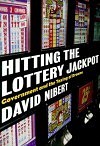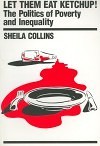Philosophy

This new edition updates a highly acclaimed work with an analysis of the most recent developments in welfare “reform” and welfare rights activism. Drawing on first-hand reports of women forced to leave welfare and other newly available data, Mimi Abramovitz documents the impact of this historic change in public policy on the lives of poor single mothers and their children. She punctures the highly publicized claims that equate successful reform with shrunken rolls, showing that if the reformers set out to improve the lives of women and children, something went dangerously awry. Abramovitz argues that welfare reform has penalized single motherhood; exposed poor women to the risks of hunger, homelessness, and male violence; swept them into low-paid jobs, and left many former recipients unable to make ends meet. | more…

Hitting the Lottery Jackpot is a timely critique of the economic and social costs of state reliance on lotteries to generate public revenues. David Nibert highlights the conflicting role of the state as gambling promoter to show who really profits—advertising agencies, TV stations, and ticket vendors—with less than half the money wagered returned as prizes. Hitting the Lottery Jackpotalso shows who loses: lower-income groups and people of color, who spend a much higher percentage of their income on lotteries than others. | more…

In this fact-filled, sweeping treatment, George Winslow takes on every aspect of the topic, from the streets to the suites. Unlike conventional accounts, Capital Crimes locates the problem within the context of the global economy from the Burmese heroin trade to homicide in the United States, from the capital flight that has generated crime in inner cities to corporate money-laundering schemes revealing how the occurrence, extent, and type of crime committed, as well as society’s response to the problem, are largely determined by economic forces shaped by elite interests. | more…

In the Shadow of Empire: Canada for Americans invites Americans to take a closer look at their neighbor to the north, challenging the commonly held view that Canada is just like the United States. American-born but a longtime resident of Canada, Joseph K. Roberts brings into focus every major feature of Canada’s politics, from the distinctiveness of a society that does not stigmatize government action to the struggles of indigenous peoples and the quest of French-speaking Quebec for autonomy. | more…

Science fascinates us, with popularizations of it regularly heading the bestseller lists, and more people feeling comfortable with the technological applications of science which surround us. Why is it then that in the late twentieth century, “back to nature” has replaced “progress through science” in the popular imagination? | more…

Are we now in an age of “postmodernity”? Even as some on the right have proclaimed the “end of history” or the final triumph of capitalism, we are told by some left intellectuals that the “modern” epoch has ended, that the “Enlightenment project” is dead, that all the old verities and ideologies have lost their relevance, that the old principles of rationality no longer apply, and so on. Yet what is striking about the current diagnosis of postmodernity is that it has so much in common with older pronouncements of death, both radical and reactionary versions. What has ended, apparently, is not so much another, different epoch but the same one all over again. | more…

What is civilization? The term, commonly identified with “uplift” and “order,” has come to take on another meaning: the “civilized” versus the “primitive.” This book is about the idea of civilization and how, at different times, the concept has been used by the powerful in order to defend their status. Drawing on his extensive knowledge of early societies, anthropologist Thomas C. Patterson shows how class, sexism, and racism have been integral to the appearance of “civilized” societies in Western Europe. | more…

Let Them Eat Ketchup! — the title comes from a Reagan administration decision to classify ketchup as a vegetable in federal school lunch programs — explains: how governments define and measure poverty, how and why official definitions of poverty fall short, and the failure to deal with the real suffering and inequality in our “class-free” society. | more…

Ernst Fischer has crafted a brief, clear, and faithful exposition of Marx's main premises, with particular emphasis on historical context. This new edition of the English translation of Was Marx wirklich sagte (1968) includes new contributions by John Bellamy Foster that sharpen Fischer's focus for today's readers. Also included are a biographical chronology, extracts from major works of Marx, and “Marx's Method,” a valuable essay by the political economist Paul Sweezy. | more…

West, professor of religion and director of the Afro-American studies program at Princeton University, shows that not only was ethics an integral part of the development of Marx’s own thinking throughout his career, but that this crucial concern has been obscured by such leading and influential interpreters as Engels, Kautsky, Lukács, and others who diverted Marx’s theory into narrow forms of positivism, economism, and Hegelianism. | more…

Much of Karl Marx’s most important work came out of his critique of other thinkers, including many socialists who differed significantly in their conceptions of socialism. The fourth volume in Hal Draper’s series looks at these critiques to illuminate what Marx’s socialism was, as well as what it was not. Some of these debates are well-known elements in Marx’s work, such as his writings on the anarchists Proudhon and Bakunin. Others are less familiar, such as the writings on “Bismarckian socialism” and “Boulangism,” but promise to become better known and understood with Draper’s exposition. He also discusses the more general ideological tendencies of “utopian” and “sentimental” socialisms, which took various forms and were ingredients in many different socialist movements. | more…
Sol Yurick writes radical novels, good ones, and loves to speculate on how culture gets inside people’s bones. In the early 1970s, Sol and I spend a lot of time musing over Monopoly, a game many leftists love to hate, others hate to love, and practically everybody plays. According to Shelly Berman, the comedian, “Monopoly evokes a unique emotion, the surge of thrill you get when you know you’ve wiped out a friend.” But what else is going on as we accumulate property and scheme how to beggar our neighbors? Are we simply expressing some atavistic urge for power, or tuning in, consciously or unconsciously, to the attitudes that are most highly prized in our business-oriented society? | more…










